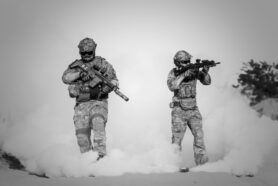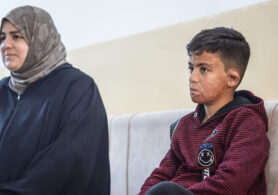“But you are not a real pilot…” a drone operator is bluntly told in Omar Fast’s 5000 Feet is Best (2011). The scene is fictional but grounded in the realities of remote warfare, begging the question of what – if not a pilot – a drone operator really is. The fighter pilot has been romanticised and idolised in countless stories, fictional and non-fictional, for as long as aerial warfare has been conducted. By contrast, despite the iconic status of the drone in contemporary warfare, the nature of the drone operator remains a mystery.
In The Labor of Surveillance and Bureaucratized Killing, Peter Asaro (2013) considers what it means to be a drone operator. The unique voyeurism of monitoring targets from afar, often for hours on end, is riddled with contradictions. Simultaneously distant yet intimate, safe yet stressful, the work of operating a drone is in many ways emblematic of remote warfare more generally. Their allegedly “unmanned” nature, he notes, conceals the vast amounts of human labour required to operate them, echoing the awkward truth that “remote” warfare is only remote for some.
Asaro seeks to bridge understanding the individual psychological burden placed on drone operators with their position as workers in an elaborate social structure. Through the term “bureaucratised killing,” he succinctly summarises the inherent tensions of human-machine work of this nature. The intense cognitive and emotional toll this work takes on drone operators is unique, contrasting sharply with the bureaucratic and technocratic means by which it is carried out.
Studying drone operators is notoriously difficult, which is in itself a curious anomaly vis-a-vis regular soldiers. Nevertheless, it is an increasingly important endeavour. Understanding the impact of remote warfare not only on its victims but also its faraway footsoldiers is vital to a comprehensive understanding of warfare in the 21st century. Or, in other words, what a real pilot is today.
Source:



